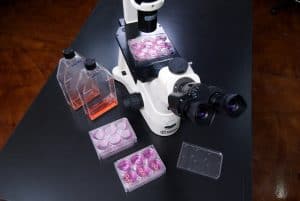Nelson Labs has recently received ASCA accreditation for Biocompatibility, specifically cytotoxicity and sample preparation (ID TL-65). The Accreditation Scheme for Conformity Assessment (ASCA) is offered through the FDA CDRH Standards and Conformity Assessment Program (S-CAP). The goals of the ASCA program are to:
- Enhance confidence in medical device testing

- Promote consistency and predictability in the premarket review process
- Encourage effective use of FDA resources
- Enhance regulatory efficiency
- Support international harmonization
This is considered an FDA pilot program that focuses on a selected list of approximately 100 standards. The list of standards comprises mainly Medical Electrical Equipment (i.e., 60601 and 80601 series) with a few biocompatibility standards included (USP <151>, and ISO 10993 parts 4, 5, 10, 11, and 12). Through this program, the FDA grants qualified accreditation bodies “ASCA Recognition” to accredit testing laboratories to perform premarket testing for medical device companies. The ASCA pathway is a voluntary program designed to reduce the review time for commonly used medical device types that are substantially equivalent to devices currently on the market.
Currently, there are five accreditation bodies listed in the US: A2LA, ANSI National Accreditation Board (ANAB), International Accreditation Service, Inc. (IAS), National Voluntary Laboratory Accreditation Program (NVLAP), and Perry Johnson Laboratory Accreditation, Inc. (PJLA). Of these listed, three are accredited for Biocompatibility: A2LA, ANAB, and PJLA. ASCA utilizes existing programs that recognize expertise and capability for accreditation bodies through the ILAC MRA signatories list. Furthermore, the accreditation bodies submit annual reports, are audited and trained by the FDA, and also hold regular teleconferences with the FDA.
Accreditation for laboratories begins with the ASCA-recognized accreditation body. The laboratory must submit a scope for the application that is within the pilot program and within the realm of expertise for the accreditation body. The lab is audited to ensure compliance to ISO/IEC 17025 and 12 CFR 58 GLP, which naturally includes a review of complaint files, test protocols, and quality systems. Once the accreditation body has granted accreditation, documentation is submitted to the FDA for final approval. By joining this program, the laboratories are subject to ASCA specific audits from the accreditation bodies and the FDA. The ASCA accreditation for laboratories also comes with an expectation that the final reports, termed ASCA Summary Test Reports, include the specific information required in the testing standards and additional information that is relevant for FDA concerns.
Nelson is working on adding hemolysis and complement activation testing to our ASCA accreditation list. However, Nelson does not conduct in vivo testing and will continue our work to advance in vitro alternatives. We applaud the FDA’s efforts to streamline the review of conforming medical device types under the ASCA program.
Based on the voluntary nature of the program, the benefit to medical device manufacturers and CROs it is difficult to gauge so far. It is noticeable that the current ASCA biocompatibility standards does not include the most recently added in vitro irritation testing in ISO 10993-23. As the goal for the industry and the FDA is to incorporate the 3R principle into our programs, it is hoped that in vitro and alternate methods will be soon added to encourage creativity and innovation.



